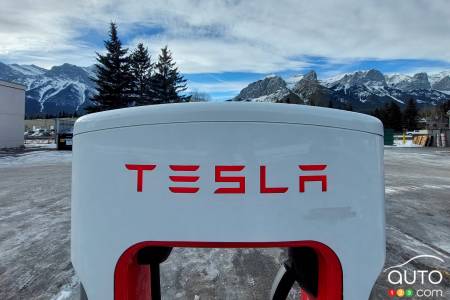A Léger poll commissioned by the Canadian Taxpayers Federation (CTF) shows that 59 percent of Canadians are not in favour of federal legislation that will allow only sales of zero-emission vehicles in the country from 2035.
As Automotive News reports, under the electric vehicle availability standard, “zero-emission” models must account for an increasing percentage of sales each year. The target is 20 percent by 2026, and it rises from there to hit 100 percent as of 2035. From that point onwards, the sale of new gas-powered vehicles will be prohibited by law.
“The results of the poll are clear: Canadians don't want the government to ban new gas and diesel vehicles. Canadians want the option to buy gas-powered minivans and diesel work trucks, and taxpayers know this ban will cost us a fortune.”
- Franco Terrazzano, FCC federal director
According to the Léger poll, which asked Canadians whether they supported or opposed the federal ban on the sale of new gasoline and diesel vehicles, 59 percent oppose the ban, 29 percent are in favour and 12 percent remain undecided.

The results also show a divide between different categories of Canadians.
Disagreement with the legislation is highest among Canadians aged 35 and over (63 percent), Western Canadians (66 percent), where truck sales dominate, and rural residents (72 percent) living in areas where charging infrastructure is weaker and concerns about range are highest.
By contrast, the strongest support comes from 18–34-year-olds and urban Canadians, 37 percent of whom who approve of the legislation.
The Léger survey comes three months after J.D. Power Canada released its own study showing that Canadians have grown less enthusiastic about owning an electric vehicle.
That study, published at the end of May, showed that just over a quarter of new vehicle buyers in Canada said they would consider an all-electric model for their next purchase. 10.9 percent of those surveyed said they were “very likely” to consider an electric vehicle, and 17.6 percent were “fairly likely” to consider one.
In contrast, 52 percent of potential buyers said they were “very unlikely” to take the plunge, and 19.6 percent said they were “fairly unlikely” to do so.

For the moment, it's important to remember, sales of electric models are still growing, even if the anticipated curve for their increase is not as steep as expected. Will the trend plateau?
Concerns about range, limited recharging infrastructure and model cost were the main stumbling blocks cited by respondents in the J.D. Power survey.
And once again, this reality varies depending on where in Canada respondents live, especially when it comes to range and charging infrastructure.
The question of credits
Under the new legislation, manufacturers will be awarded credits for their sales of zero-emission vehicles.
Those who exceed their targets will be able to trade in their credits or bank them for up to five model-years. Companies that fail to meet their targets will generate a deficit, which must be absorbed within the following three model-years.
No accumulated or banked credits may be used to offset a deficit from model-year 2035 onwards.
Carmakers who fail to sell enough zero-emission vehicles will be financially penalized, although the actual cost is not yet known.
Manufacturers who find themselves in a credit crunch will be able to buy from other manufacturers. The cost of that will be determined by the market.
Another means of compliance will be to invest in recharging infrastructures. Manufacturers will receive a credit for every $20,000 invested. The aim is to encourage the construction of a fast-charging infrastructure for electric vehicles, which will encourage their adoption by the population.
Terrazzano of the FCC is concerned the legislation will have an impact on consumers.
“Prime Minister Justin Trudeau is going full throttle with his new gas and diesel vehicle ban without talking about the massive costs this ban will impose on taxpayers. Canadians have every reason to worry their tax and power bills will rise to pay for all the subsidies, charging stations, power plants and transmission lines required for Trudeau's ban.
Trudeau should listen to Canadians, take this poll as a wake-up call and scrap his ban on new gas and diesel vehicles.”
Léger's online survey polled 1,612 Canadians aged 18 and over, between September 20 and 22. The margin of error for the survey is plus or minus 2.4%, 19 times out of 20.
One thing is certain: the debate is far from over.





